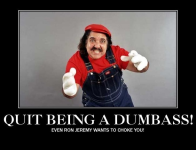We get closer every year by following the same policies that have been in place for decades.
I doubt that, but your pessimism is noted.
This may be true, but the reverse is not. China bans imports of American products to protect their domestic sales. These are the type of barriers that Trump is trying to address to make things actually fair.
A billion people or not, China has a GDP per capita comparable to Iraq.
Expecting them to buy as much from us as we do from them is not an obtainable or even desirable goal at the present time.
The primary advantage China has is that their industries are largely state sponsored and financed.
Short of the CCP collapsing (which could actually be part of Trump's goal), China is not going to stop being a quasi-communist country. No matter how much pressure we try to apply on them.
When it comes to China, the focus should be on restricting our tech trade with them, as it is as much a matter of national security as it is economic prosperity.
It sucks for shareholders of companies like Apple and Nvidia, but tough titties.
Trump’s tax cuts did what they were supposed to do, incentivize investment in American businesses and repatriate off shore money. The issue is that CONGRESS did NOT do anything to reduce spending.
Unless Congress addresses entitlement costs, everything else is just picking at the fringes of the budget.
Healthcare in particular is now around 20% of GDP compared to around 5% in the early 1990s. It's not sustainable.
What is your suggestion for a “better” tax policy?
Higher corporate tax rates, obviously.
I know that is blasphemy from your perspective, but they were over 50% in the middle of the last century and we had a pretty strong economy in the 1950s and 60s.
The effective rates have been steadily going down since the 1980s while factories have been outsourced by the thousands.
I'm all for offering lower rates to companies that invest more in the US.
Your implication is that he is sole intention is to use tariffs for income only. Maybe that is his plan, but it appears that he is using them as bargaining chips. If they were only for revenue, you would set them and move on. If they are bargaining chips, you pause them when you get a country to the table as a show of good faith. During negotiations you can then unpause them if you need to.
We'll see how it plays out, but it is not really clear what Trump's aiming for here.
It's a matter of benefits vs costs.
If he simply wants other countries to drop their tariffs on US production, there is limited upside to it, as many of these countries simply don't have the means to buy much more from us than they already do, even the larger ones like China.
If he wants to bring significant amounts of capital back to the US, it will work only if he keeps the tariffs in place indefinitely, which will severely slow and disrupt the economy during the transition.
As far as housing costs, there are many issues at play here.
1. Building trades have been vilified as poor career paths
2. Massive purchasing of housing by private equity firms to force renting
3. Reluctance to build more affordable single family homes to protect the rental markets
4. Government red tape and barriers to building homes
5. Etc
I think the "financialization" of housing in recent decades has been the greatest issue.
Viewing shelter more as an investment than an essential durable good has created a huge conflict of interests in the economy where since the 2008 crisis, keeping inventory tight and prices up has taken priority over construction financing and affordability.
It's a pretty ominous sign when interest rates go up as much as they have in recent years while home prices continue to increase.

